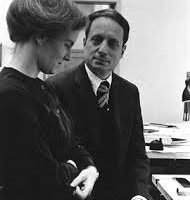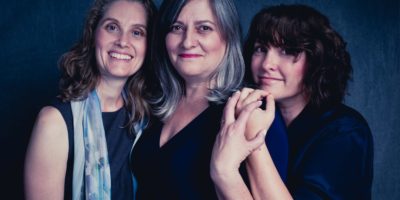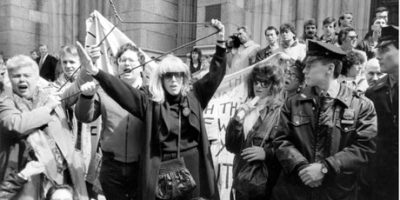At 40, “Fear of Flying”
A conversation with Erica Jong
AG: I’ve heard that with all the publicity that surrounded Fear of Flying, there were some anti-Semitic responses.
EJ: Our culture is more puritanical than we realize. So a book that people see as sexual raises all kinds of hackles. As a poet and a scholar, I never got hate mail. Poetry is not the language of our land—so even an erotic poem doesn’t subject you to ridicule. But novels are a different story. And novels that become number one bestsellers have a much broader reach. When Fear of Flying was originally published, I got sacks and sacks of mail. Some of it was abusive. “Only commie kike bitches have such dirty minds!” is one I remember. The story of the Jewish women in America is one of the founding of settlement houses, participating in the civil rights movement, raising money for progressive causes. Jewish women have been extremely active in making America a more egalitarian country. And yet, if a Jewish woman is perceived as sexual, all hell breaks loose.
AG: What inspired you to write a character as courageous and outspoken as Isadora Wing?
EJ: At that time critics were used to seeing a novel in a certain way—the woman heroine mediated by the male eye. So they got very excited in the 1970s that women were writing books, but they didn’t really know what was different about women’s books. I knew intuitively that I had to be inside the heroine, trying to bring her mind and body together.
Initially, I wrote Fear of Flying from a male point of view because those were the novels I read — Bellow, Roth, Mailer — they were the ones hailed as great. And I remember my first editor at Holt, Aaron Asher, asking me, “Why are you impersonating a male narrator? Why aren’t you writing your novel in the voice of your poems? That is a new voice, that is the voice that needs to be heard.” And that was the right comment at the right time. Bless him for that.
I was also inspired by the events that were happening in my own life. I had gone to a conference of psychoanalysts with Allan Jong, my then-husband, and I thought, this is the perfect framing device for the book. Here is a woman who has been in analysis all her life and she goes to a conference of psychoanalysts in which one of her analysts is speaking. From this experience I imagined a woman at this Congress of Dreams. And she is almost forced to plunge back into her mental life, her dream life. And that became the frame for a book about a woman searching for herself.
AG: Did you know from the beginning that Isadora was a “new” kind of woman?
EJ: When I was writing it I was really scared that it would never be published because it was so outspoken. Women were writing mad housewife novels. Men were writing about men and their problems, intellectual men and their sex lives, in which the women were very much externalized. But I was driven to write it, to write about a rounded woman who had all these parts to her and who wasn’t afraid to see and understand the connection of these parts.
AG: What would you say were the strongest literary influences that compelled you to write Fear of Flying?
EJ: If there were two novels that most influenced Fear of Flying, they were The Golden Notebook and Portnoy’s Complaint. The Golden Notebook because Doris Lessing acknowledges women are bodies and souls and she tries to unite them and Portnoy’s Complaint because it’s a very honest rant about how a man’s sexuality influences the rest of his life. I wanted to tell the story of women’s bodies and how they influence our lives. Our bodies do influence the way we think about the world. This is probably politically incorrect to say. Portnoy opened a door for both men and women.
AG: How do you think the attitudes toward Isadora have evolved since the 1970s?
EJ: I don’t think writers always consciously know what they’re doing. If you think about Walt Whitman or Emily Dickinson, how could either of them know how their work would come to be seen? Whitman, we now say, was inventing a kind of free verse, but he didn’t know that at the time. He didn’t know that what he was doing was revolutionary. He had to review his own books in the Brooklyn Eagle because nobody wanted to review him. But he was driven to write, and he invented a new form of poetry.
I wanted Isadora to break the mold, to smash conventional genres, and in doing so she can speak to each generation that reads her. And I stress this because I think it’s negative for writers to worry too much about genre. If you can liberate yourself from your particular decade’s notion of genre, you may be able to create something new.
AG: What do you think Isadora can offer today’s generation?
EJ: In a lot of ways we have gone backwards. With the emphasis on what has become known as the “hook up culture,” and the fear of feminism — the word, if not the idea — we have surely regressed. Sex is more than just a physical manifestation. And that is really what Isadora was able to understand. In a puritanical society we’re always going to fall back to seeing sex as just sex. But sex is not just sex. Our sexual being and our hormonal being not only inform our physical beings but also our spiritual beings.
Wholeness is hard to achieve. It’s easier to fragment ourselves, and in the beginning Isadora was only able to express those fragments. But Fear of Flying is her journey to acceptance of body and soul.
Aryanna Garber is a writer and filmmaker. She is a graduate of Barnard College and has an M.S. in Narrative Medicine from Columbia University.




